修饰可数名词和不可数名词的词()
- 格式:docx
- 大小:12.54 KB
- 文档页数:2
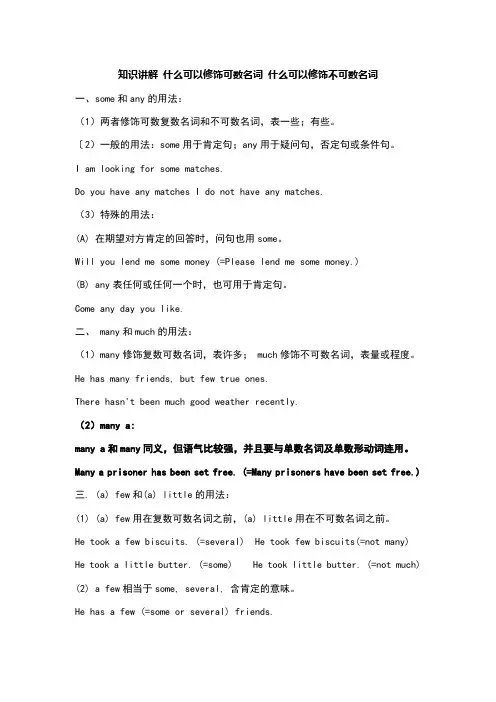
知识讲解什么可以修饰可数名词什么可以修饰不可数名词一、some和any的用法:(1)两者修饰可数复数名词和不可数名词,表一些;有些。
〔2)一般的用法:some用于肯定句;any用于疑问句,否定句或条件句。
I am looking for some matches.Do you have any matches I do not have any matches.(3)特殊的用法:(A) 在期望对方肯定的回答时,问句也用some。
Will you lend me some money (=Please lend me some money.)(B) any表任何或任何一个时,也可用于肯定句。
Come any day you like.二、 many和much的用法:(1)many修饰复数可数名词,表许多; much修饰不可数名词,表量或程度。
He has many friends, but few true ones.There hasn't been much good weather recently.(2)many a:many a和many同义,但语气比较强,并且要与单数名词及单数形动词连用。
Many a prisoner has been set free. (=Many prisoners have been set free.)三. (a) few和(a) little的用法:(1) (a) few用在复数可数名词之前,(a) little用在不可数名词之前。
He took a few biscuits. (=several) He took few biscuits(=not many) He took a little butter. (=some) He took little butter. (=not much) (2) a few相当于some, several, 含肯定的意味。
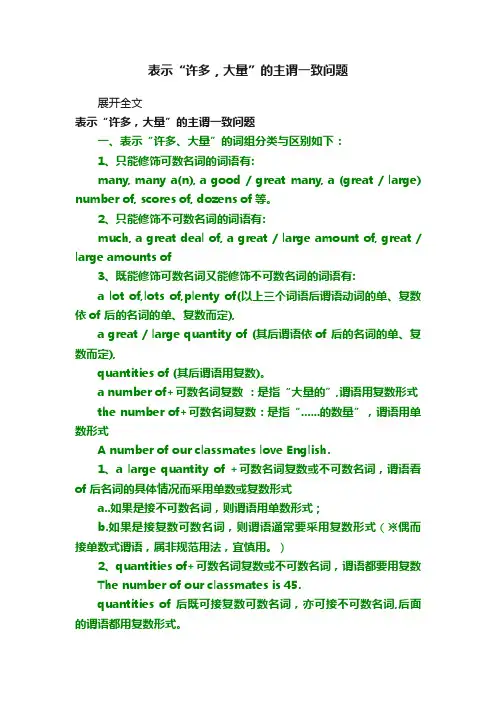
表示“许多,大量”的主谓一致问题展开全文表示“许多,大量”的主谓一致问题一、表示“许多、大量”的词组分类与区别如下:1、只能修饰可数名词的词语有:many, many a(n), a good / great many, a (great / large) number of, scores of, dozens of等。
2、只能修饰不可数名词的词语有:much, a great deal of, a great / large amount of, great / large amounts of3、既能修饰可数名词又能修饰不可数名词的词语有:a lot of,lots of,plenty of(以上三个词语后谓语动词的单、复数依of 后的名词的单、复数而定),a great / large quantity of (其后谓语依of 后的名词的单、复数而定),quantities of (其后谓语用复数)。
a number of+可数名词复数:是指“大量的”,谓语用复数形式the number of+可数名词复数:是指“......的数量”,谓语用单数形式A number of our classmates love English.1、a large quantity of +可数名词复数或不可数名词,谓语看of后名词的具体情况而采用单数或复数形式a..如果是接不可数名词,则谓语用单数形式;b.如果是接复数可数名词,则谓语通常要采用复数形式(※偶而接单数式谓语,属非规范用法,宜慎用。
)2、quantities of+可数名词复数或不可数名词,谓语都要用复数The number of our classmates is 45.quantities of 后既可接复数可数名词,亦可接不可数名词,后面的谓语都用复数形式。
many a(很多);more than one(比…多/不只一个)(加基数词one)1.many a 或more than one +可数名词单数,谓语用单数2.more+复数名词+than one结构之后,谓语动词一般用复数形式。
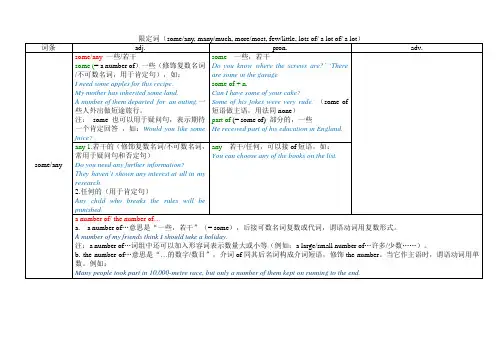
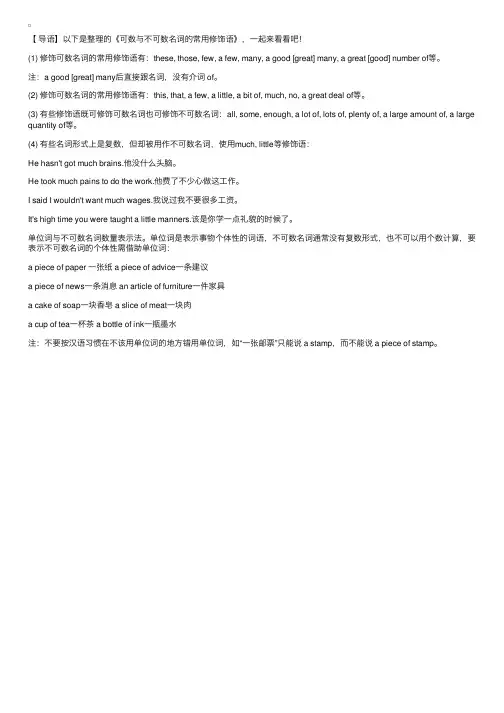
【导语】以下是整理的《可数与不可数名词的常⽤修饰语》,⼀起来看看吧!(1) 修饰可数名词的常⽤修饰语有:these, those, few, a few, many, a good [great] many, a great [good] number of等。
注:a good [great] many后直接跟名词,没有介词 of。
(2) 修饰可数名词的常⽤修饰语有:this, that, a few, a little, a bit of, much, no, a great deal of等。
(3) 有些修饰语既可修饰可数名词也可修饰不可数名词:all, some, enough, a lot of, lots of, plenty of, a large amount of, a large quantity of等。
(4) 有些名词形式上是复数,但却被⽤作不可数名词,使⽤much, little等修饰语:He hasn't got much brains.他没什么头脑。
He took much pains to do the work.他费了不少⼼做这⼯作。
I said I wouldn't want much wages.我说过我不要很多⼯资。
It's high time you were taught a little manners.该是你学⼀点礼貌的时候了。
单位词与不可数名词数量表⽰法。
单位词是表⽰事物个体性的词语,不可数名词通常没有复数形式,也不可以⽤个数计算,要表⽰不可数名词的个体性需借助单位词:a piece of paper ⼀张纸 a piece of advice⼀条建议a piece of news⼀条消息 an article of furniture⼀件家具a cake of soap⼀块⾹皂 a slice of meat⼀块⾁a cup of tea⼀杯茶 a bottle of ink⼀瓶墨⽔注:不要按汉语习惯在不该⽤单位词的地⽅错⽤单位词,如“⼀张邮票”只能说 a stamp,⽽不能说 a piece of stamp。
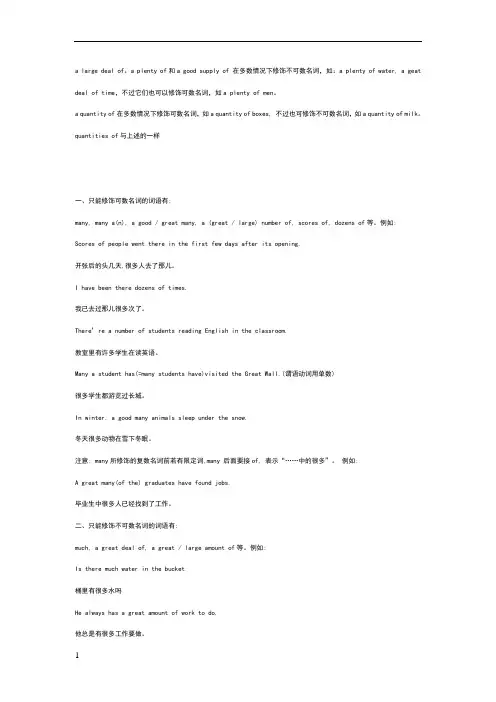
a large deal of、a plenty of和a good supply of 在多数情况下修饰不可数名词,如:a plenty of water, a geat deal of time,不过它们也可以修饰可数名词,如a plenty of men。
a quantity of在多数情况下修饰可数名词,如a quantity of boxes, 不过也可修饰不可数名词,如a quantity of milk。
quantities of与上述的一样一、只能修饰可数名词的词语有:many, many a(n), a good / great many, a (great / large) number of, scores of, dozens of等。
例如: Scores of people went there in the first few days after its opening.开张后的头几天,很多人去了那儿。
I have been there dozens of times.我已去过那儿很多次了。
There’re a number of stude nts reading English in the classroom.教室里有许多学生在读英语。
Many a student has(=many students have)visited the Great Wall.(谓语动词用单数)很多学生都游览过长城。
In winter, a good many animals sleep under the snow.冬天很多动物在雪下冬眠。
注意: many所修饰的复数名词前若有限定词,many 后面要接of, 表示“……中的很多”。
例如:A great many(of the) graduates have found jobs.毕业生中很多人已经找到了工作。
二、只能修饰不可数名词的词语有:much, a great deal of, a great / large amount of等。
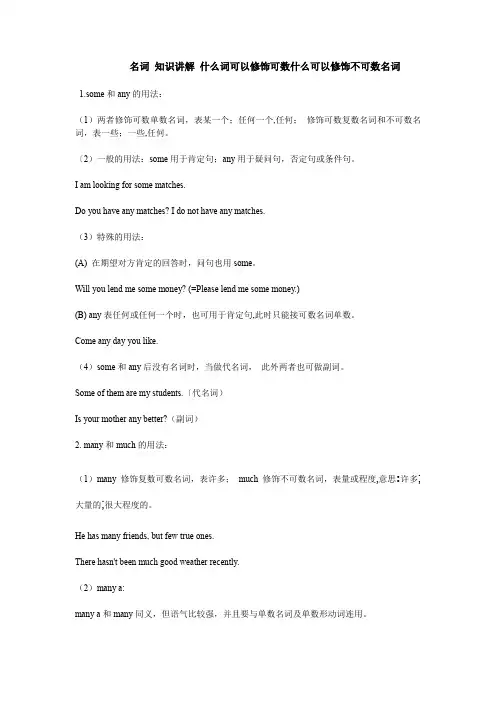
名词知识讲解什么词可以修饰可数什么可以修饰不可数名词1.some和any的用法:(1)两者修饰可数单数名词,表某一个;任何一个,任何;修饰可数复数名词和不可数名词,表一些;一些,任何。
〔2)一般的用法:some用于肯定句;any用于疑问句,否定句或条件句。
I am looking for some matches.Do you have any matches? I do not have any matches.(3)特殊的用法:(A) 在期望对方肯定的回答时,问句也用some。
Will you lend me some money? (=Please lend me some money.)(B) any表任何或任何一个时,也可用于肯定句,此时只能接可数名词单数。
Come any day you like.(4)some和any后没有名词时,当做代名词,此外两者也可做副词。
Some of them are my students.〔代名词)Is your mother any better?(副词)2. many和much的用法:(1)many修饰复数可数名词,表许多;much修饰不可数名词,表量或程度,意思:许多;大量的;很大程度的。
He has many friends, but few true ones.There hasn't been much good weather recently.(2)many a:many a和many同义,但语气比较强,并且要与单数名词及单数形动词连用。
Many a prisoner has been set free. (=Many prisoners have been set free.)(3)as many和so many均等于the same number of。
前有as, like时, 只用so many。
These are not all the books I have. These are as many more upstairs.They worked like so many ants.(4)as much等于the same amount of, 表同量和同一事情。
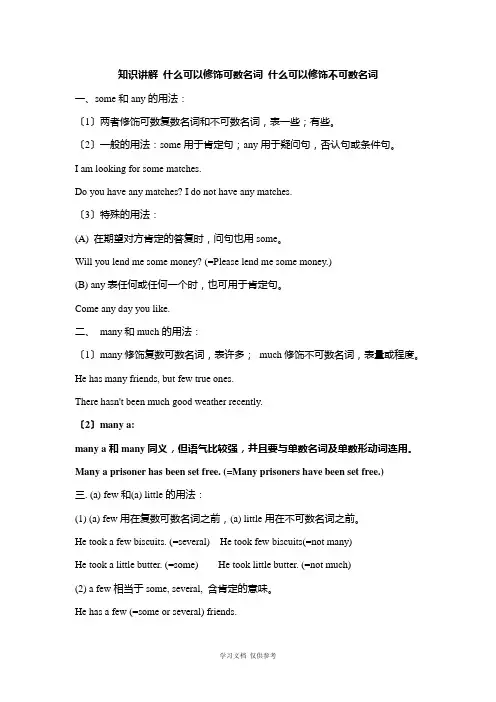
知识讲解什么可以修饰可数名词什么可以修饰不可数名词一、some和any的用法:〔1〕两者修饰可数复数名词和不可数名词,表一些;有些。
〔2〕一般的用法:some用于肯定句;any用于疑问句,否认句或条件句。
I am looking for some matches.Do you have any matches? I do not have any matches.〔3〕特殊的用法:(A) 在期望对方肯定的答复时,问句也用some。
Will you lend me some money? (=Please lend me some money.)(B) any表任何或任何一个时,也可用于肯定句。
Come any day you like.二、many和much的用法:〔1〕many修饰复数可数名词,表许多;much修饰不可数名词,表量或程度。
He has many friends, but few true ones.There hasn't been much good weather recently.〔2〕many a:many a和many同义,但语气比较强,并且要与单数名词及单数形动词连用。
Many a prisoner has been set free. (=Many prisoners have been set free.)三. (a) few和(a) little的用法:(1) (a) few用在复数可数名词之前,(a) little用在不可数名词之前。
He took a few biscuits. (=several) He took few biscuits(=not many)He took a little butter. (=some) He took little butter. (=not much)(2) a few相当于some, several, 含肯定的意味。
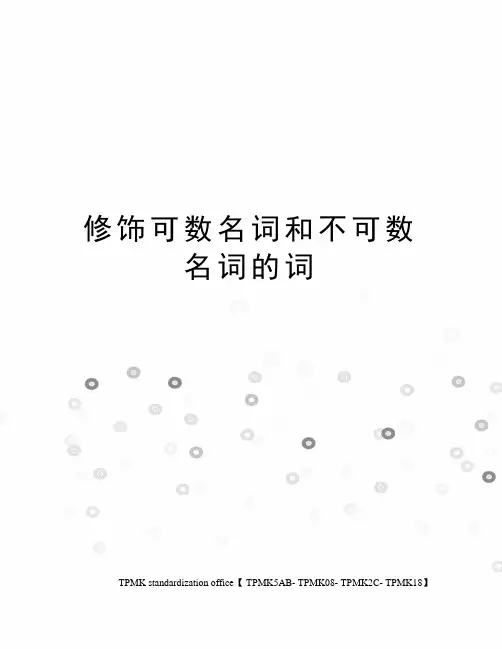
修饰可数名词和不可数名词的词TPMK standardization office【 TPMK5AB- TPMK08- TPMK2C- TPMK18】修饰可数名词和不可数名词的词首先要搞清楚,是修饰可数名词或不可数名词,而不是单数或复数名词。
可数名词都有复数形式,而不可数名词没有复数形式。
a large deal of, plenty of和a good supply of 在多数情况下修饰不可数名词,如: plenty of water, a great deal of time,不过它们也可以修饰可数名词,如 plenty of men。
a quantity of在多数情况下修饰可数名词,如a quantity of boxes, 不过也可修饰不可数名词,如a quantity of milk。
quantities of与上述的一样一、只能修饰可数名词的词语有: many, many a(n), a good / great many, a (great / large) number of, scores of, dozens of 等。
例如:Scores of people went there in the first few days after its opening. 开张后的头几天,很多人去了那儿。
I have been there dozens of times. 我已去过那儿很多次了。
There’re a number of students re ading English in the classroom. 教室里有许多学生在读英语。
Many a student has(=many students have)visited the Great Wall.(谓语动词用单数) 很多学生都游览过长城。
In winter, a good many animals sleep under the snow. 冬天很多动物在雪下冬眠。
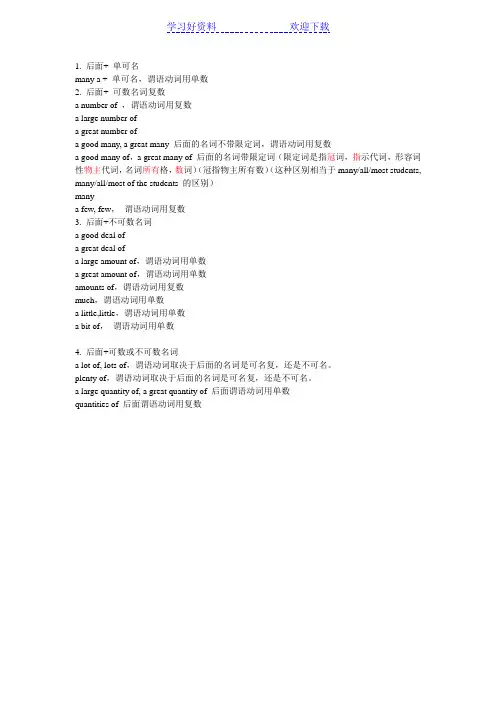
学习好资料欢迎下载
1. 后面+ 单可名
many a + 单可名,谓语动词用单数
2. 后面+ 可数名词复数
a number of ,谓语动词用复数
a large number of
a great number of
a good many, a great many 后面的名词不带限定词,谓语动词用复数
a good many of,a great many of 后面的名词带限定词(限定词是指冠词,指示代词,形容词性物主代词,名词所有格,数词)(冠指物主所有数)(这种区别相当于many/all/most students, many/all/most of the students 的区别)
many
a few, few,谓语动词用复数
3. 后面+不可数名词
a good deal of
a great deal of
a large amount of,谓语动词用单数
a great amount of,谓语动词用单数
amounts of,谓语动词用复数
much,谓语动词用单数
a little,little,谓语动词用单数
a bit of,谓语动词用单数
4. 后面+可数或不可数名词
a lot of, lots of,谓语动词取决于后面的名词是可名复,还是不可名。
plenty of,谓语动词取决于后面的名词是可名复,还是不可名。
a large quantity of, a great quantity of 后面谓语动词用单数
quantities of 后面谓语动词用复数。
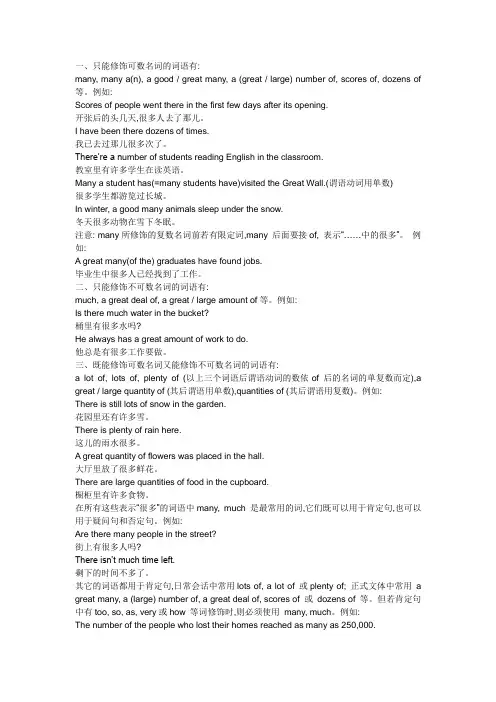
一、只能修饰可数名词的词语有:many, many a(n), a good / great many, a (great / large) number of, scores of, dozens of 等。
例如:Scores of people went there in the first few days after its opening.开张后的头几天,很多人去了那儿。
I have been there dozens of times.我已去过那儿很多次了。
There’re a n umber of students reading English in the classroom.教室里有许多学生在读英语。
Many a student has(=many students have)visited the Great Wall.(谓语动词用单数)很多学生都游览过长城。
In winter, a good many animals sleep under the snow.冬天很多动物在雪下冬眠。
注意: many所修饰的复数名词前若有限定词,many 后面要接of, 表示“……中的很多”。
例如:A great many(of the) graduates have found jobs.毕业生中很多人已经找到了工作。
二、只能修饰不可数名词的词语有:much, a great deal of, a great / large amount of等。
例如:Is there much water in the bucket?桶里有很多水吗?He always has a great amount of work to do.他总是有很多工作要做。
三、既能修饰可数名词又能修饰不可数名词的词语有:a lot of, lots of, plenty of (以上三个词语后谓语动词的数依of 后的名词的单复数而定),a great / large quantity of (其后谓语用单数),quantities of (其后谓语用复数)。
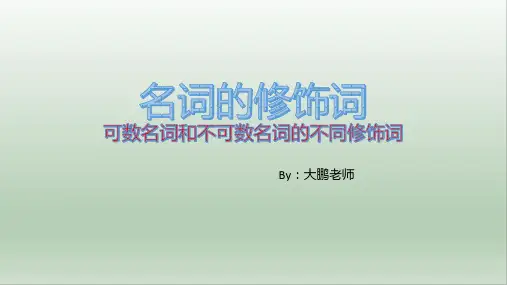
可数与不可数名词的常用修饰语一、修饰可数名词的常用修饰语有these, those, few, a few, many, a good [great] many, a great [good] number of 等:Few people would agree with this. 很少人会同意这种看法。
He has a great many friends here. 他在这儿有很多朋友。
注:a good [great] many 后直接跟名词,不用介词of。
但是,若其后所接名词有the, these, my 等限定词修饰,则要用介词of:a great many of my friends 我的朋友当中的许多人二、修饰不可数名词的常用修饰语有this, that, little, a little, a bit of, much, a great deal of, a large amount of 等:I have little time to do it. 我没什么时间来做此事。
He didn’t give me much money. 他没给我很多钱。
A great deal of money is spent on research. 研究工作上花了许多钱。
注:在现代英语中,a great amount of 后有时也接可数名词,但有许多语法学家反对,学生最好避免使用。
三、有些修饰语既可修饰可数名词也可修饰不可数名词,如all, some, enough,a lot of, lots of, plenty of, a (large) quantity of 等:You needn’t hurry. There’s plenty of time. 你不必着急。
时间多着哩。
There are plenty of men out of work. 失业的人很多。
We need a quantity of baskets. 我们需要一批篮子。
可数名词和不可数名词是中文语法中的基本概念,对于学习中文的人来说,掌握它们的用法非常重要。
本文将从可数名词和不可数名词的定义、区别、用法和举例等方面展开,帮助读者更深入地理解这一语法知识。
一、可数名词和不可数名词的定义和区别1. 可数名词:指的是可以用数目进行计算的名词,可以单数或复数形式出现。
例如:apple(苹果)、book(书)等。
2. 不可数名词:指的是不能用数目进行计算的名词,通常只有单数形式。
例如:water(水)、music(音乐)等。
二、可数名词和不可数名词的用法1. 可数名词的用法:(1)可数名词单数形式前通常需要加a/an或者数字等限定词。
(2)可数名词可以和复数动词一起使用,表示复数概念。
(3)可数名词可以和many、a few等表示数量的词语一起使用。
2. 不可数名词的用法:(1)不可数名词通常不加a/an,也不能用于复数形式。
(2)不可数名词只能和单数动词一起使用。
(3)不可数名词通常可以用much、a little等表示数量的词语修饰。
三、举例说明1. 可数名词的举例:(1)There is a book on the table.(桌子上有一本书。
)(2)I have two apples.(我有两个苹果。
)(3)There are many students in the classroom.(教室里有很多学生。
)2. 不可数名词的举例:(1)The water is clear.(水很清澈。
)(2)I like listening to music.(我喜欢听音乐。
)(3)He doesn't have much time.(他没有太多时间。
)总结回顾:通过本文的讲解,希望读者能够更清晰地理解可数名词和不可数名词的基本概念和用法。
掌握好这一语法知识可以帮助我们更准确地表达自己的意思,使语言更加地道和规范。
个人观点和理解:对于中文学习者来说,可数名词和不可数名词是一个基础但重要的知识点。
little和less的用法
"Little"和"less"都是表示数量少或程度低的形容词,但它们在
用法上有所不同。
"Little"通常用于表示数量少或程度低的事物,可以用来修饰可数名词和不可数名词。
例如:
- I have little money.(我几乎没有钱)
- There is little time left.(剩下的时间很少)
"Less"则常用于表示相对比较少或程度较低的事物,常用于比
较级和最高级的句子中。
同样可以修饰可数名词和不可数名词。
例如:
- She has less money than her brother.(她的钱比她兄弟少)
- This book is less interesting than the previous one.(这本书比之
前那本书没那么有趣)
此外,"less"还可以用作副词,表示较少或不及预期的程度。
例如:
- He works less than he used to.(他工作不如以前那么辛苦)。
知识讲解【1】什么可以修饰可数名词什么可以修饰不可数名词一、some和any的用法:(1)两者修饰可数复数名词和不可数名词,表一些;有些。
〔2)一般的用法:some用于肯定句;any用于疑问句,否定句或条件句。
I am looking for some matches.Do you have any matches? I do not have any matches.(3)特殊的用法:(A) 在期望对方肯定的回答时,问句也用some。
Will you lend me some money? (=Please lend me some money.)(B) any表任何或任何一个时,也可用于肯定句。
Come any day you like.二、 many和much的用法:(1)many修饰复数可数名词,表许多; much修饰不可数名词,表量或程度。
He has many friends, but few true ones.There hasn't been much good weather recently.(2)many a:many a和many同义,但语气比较强,并且要与单数名词及单数形动词连用。
Many a prisoner has been set free. (=Many prisoners have been set free.)三. (a) few和(a) little的用法:(1) (a) few用在复数可数名词之前,(a) little用在不可数名词之前。
He took a few biscuits. (=several) He took few biscuits(=not many)He took a little butter. (=some) He took little butter. (=not much)(2) a few相当于some, several, 含肯定的意味。
既能修饰可数名词又能修饰不可数名词的词语有:a lot of, lots of, plenty of (以上三个词语后谓语动词的数依of 后的名词的单复数而定),a great / large quantity of (其后谓语用单数),quantities of (其后谓语用复数)。
例如:There is still lots of snow in the garden.花园里还有许多雪。
There is plenty of rain here.这儿的雨水很多。
A great quantity of flowers was placed in the hall.大厅里放了很多鲜花。
There are large quantities of food in the cupboard.橱柜里有许多食物。
在所有这些表示“很多”的词语中many, much 是最常用的词,它们既可以用于肯定句,也可以用于疑问句和否定句。
例如:Are there many people in the street街上有很多人吗There isn’t much time left.剩下的时间不多了。
其它的词语都用于肯定句,日常会话中常用lots of, a lot of 或plenty of; 正式文体中常用 a great many, a (large) number of, a great deal of, scores of 或 dozens of 等。
但若肯定句中有too, so, as, very或how 等词修饰时,则必须使用 many, much。
例如:The number of the people who lost their homes reached as many as 250,000.无家可归的人数多达250,000人。
There is too much work to do.要做的工作太多了。
一、表示“很多”“大量的”时1、修饰可数名词:many、a number of、a few、many a、severa l等。
many a 的意思相当于many , 但many a 后边接可数名词单数,如:Many a student has such a question.许多同学有这样的疑问。
A number of students have passed the exam.许多学生都通过了考试。
Several days ago, I met him in the park.几天前我在公园里遇到了他。
2、修饰不可数名词:much、a (great) deal of、a (large) amount of等。
The elephant drinks much water.We can get a great deal of(a large amount of) information from internet.我们可以从互联网上获得大量信息。
3、既可修饰可数名词,也可修饰不可数名词:a lot of (lots of ); plenty of; a large quantity of等。
(*注意:a lot 是“非常”“很”)Plenty of the water is polluted.许多水都被污染了。
Plenty of the rivers are polluted.许多河都被污染了。
二、few、little;a few、a little的用法:1、few 和a few 都修饰可数名词。
few意为“几乎没有”,表示否定;a few表示“有些、几个”,表示肯定;quite a few=many(修饰可数名词)表示“许多”。
如:I have eaten a few apples today.=I have eaten many apples today.He has few friends.他几乎没有什么朋友。
修饰可数名词和不可数名词的词
首先要搞清楚,是修饰可数名词或不可数名词,而不是单数或复数名词。
可数名词都有复数形式,而不可数名词
没有复数形式。
a large deal of, plenty of和a good supply of 在多数情况下修饰不可数名词,如:plenty of water, a great deal of time,不过它们也可以修饰可数名词,如plenty of men。
a quantity of在多数情况下修饰可数名词,如a quantity of boxes, 不过也可修饰不可数名词,如a quantity of milk。
quantities of与上述的一样
一、只能修饰可数名词的词语有: many, many a(n), a good / great many, a (great / large) number of, scores of, dozens
of等。
例如:
Scores of people went there in the first few days after its opening. 开张后的头几天,很多人去了那儿。
I have been there dozens of times. 我已去过那儿很多次了。
There’re a number of students reading English in the classroom. 教室里有许多学生在读英语。
Many a student has(=many students have)visited the Great Wall.(谓语动词用单数) 很多学生都游览过长城。
In winter, a good many animals sleep under the snow. 冬天很多动物在雪下冬眠。
注意: 注:a good [great] many 后直接跟名词,不用介词of。
但是,若其后所接名词有the, these, my 等限定词修饰,则要用介词of表示“…中的很多”:例如: a great many of my friends 我的朋友当中的许多人。
A great many(of the) graduates have found jobs. 毕业生中很多人已经找到了工作。
二、只能修饰不可数名词的词语有: this, that, little, a little, a bit of, much, a great deal of, a great / large amount of等。
有些名词形式上是复数,但却被用作不可数名词,使用much, little等修饰语
例如: Is there much water in the bucket? 桶里有很多水吗?
He always has a great amount of work to do. 他总是有很多工作要做。
He hasn’t got much brains. 他没什么头脑。
He took much pains to do the work. 他费了不少心做这工作。
I said I wouldn’t want much wages. 我说过我不要很多工资。
It's high time you were taught a little manners. 该是你学一点礼貌的时候了。
三、既能修饰可数名词又能修饰不可数名词的词语有: a lot of, lots of, plenty of (以上三个词语后谓语动词的数依of
后的名词的单复数而定),a great / large quantity of (其后谓语用单数),quantities of (其后谓语用复数)all, some, enough。
例如:
There is still lots of snow in the garden. 花园里还有许多雪。
There is plenty of rain here. 这儿的雨水很多。
A great quantity of flowers was placed in the hall. 大厅里放了很多鲜花。
There are large quantities of food in the cupboard. 橱柜里有许多食物。
在所有这些表示“很多”的词语中many, much 是最常用的词,它们既可以用于肯定句,也可以用于疑问句和否定句。
例如: Are there many people in the street? 街上有很多人吗?
There isn’t much time left. 剩下的时间不多了。
其它的词语都用于肯定句,日常会话中常用lots of, a lot of 或plenty of; 正式文体中常用 a great many, a (large) number of, a great deal of, scores of 或dozens of 等。
但若肯定句中有too, so, as, very或how 等词修饰时,则必须使用many, much。
例如:
The number of the people who lost their homes reached as many as 250,000. 无家可归的人数多达250,000人。
There is too much work to do. 要做的工作太多了。